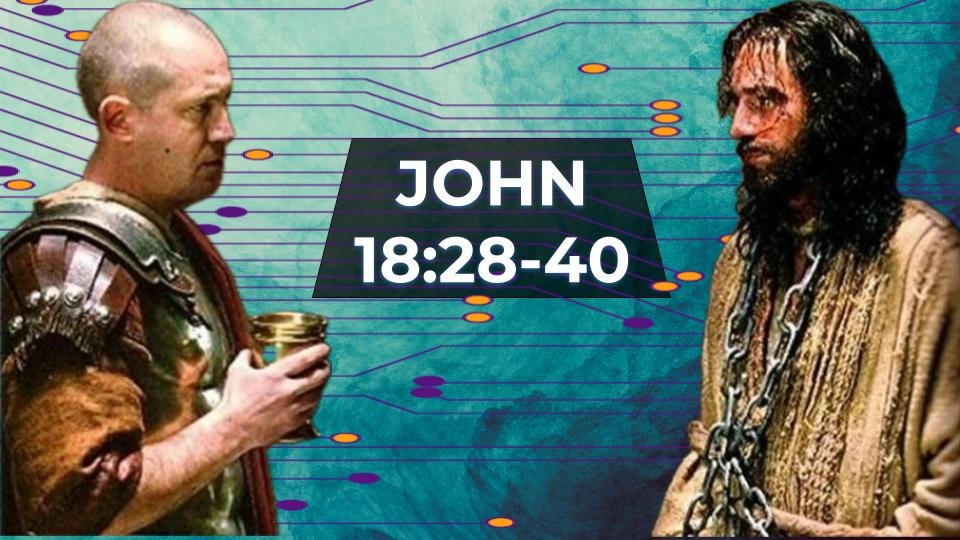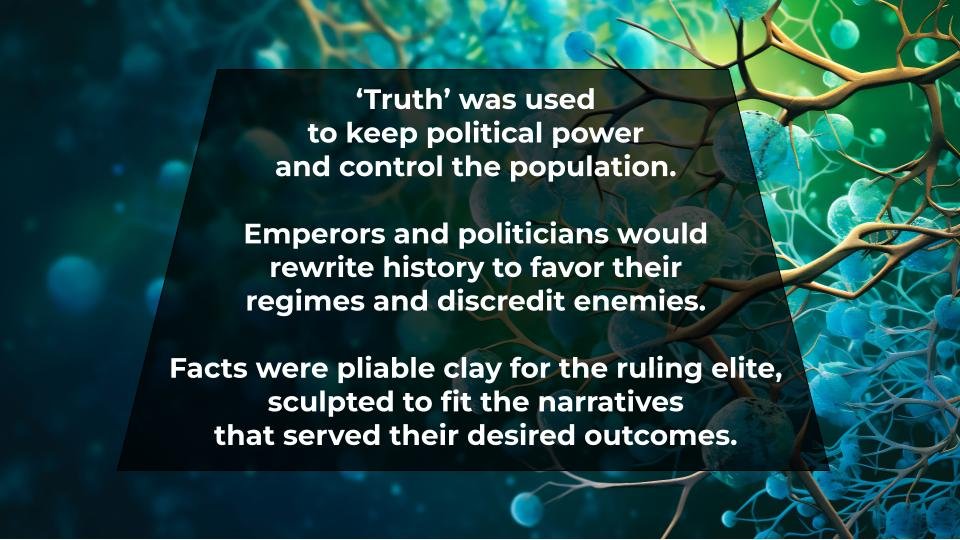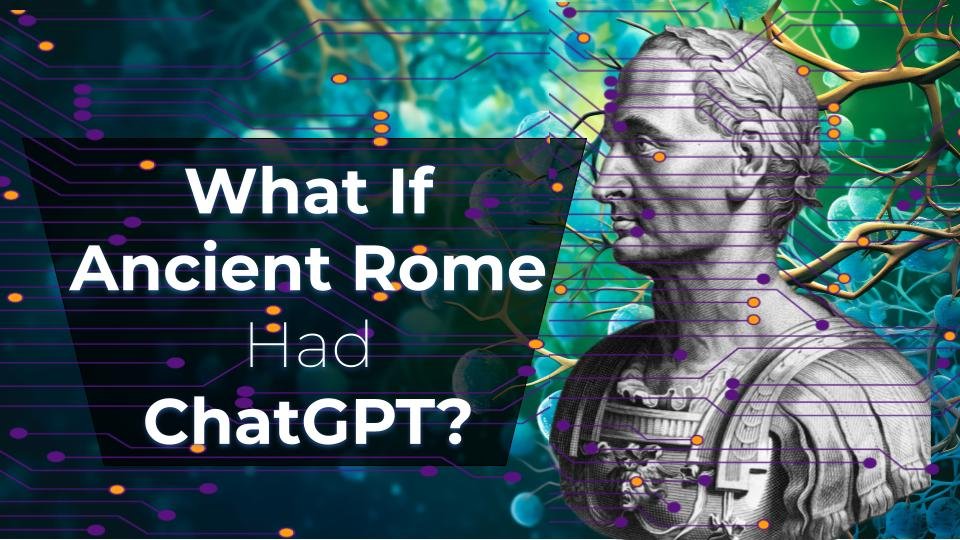What If Ancient Rome Had ChatGPT?
The full video of this teaching is available at the bottom of this post and this link.
JESUS AND THE GOVERNOR
John 18:28-40. As the sun rose over Judea, the clamor of Roman soldiers and their clanking armor echoed through the streets as they escorted Jesus to the imposing headquarters of Judea's big boss of Roman justice. Pontius Pilate watched the unfolding scene from his balcony. Below, the Jewish leaders huddled outside the headquarters to maintain their ceremonial purity. Their eyes are filled with determination to see Jesus destroyed.
Inside the Judean governor’s headquarters, Pilate’s role as overseer of legal matters, tax collection, and public order often placed him at the heart of complex and tense confrontations. Today's encounter, however, carried an air of uncertainty that even Pilate couldn't ignore. Pilate is sandwiched in a dilemma. The Jewish leaders are insistent and vague, hinting that Jesus did something wrong enough to deserve the death penalty.
Curious, Pilate goes back inside to question Jesus. Their conversation? It was two worlds colliding. Pilate is about keeping order by appeasing the right people, while Jesus talks about His Kingdom, which is all about truth, not land and soldiers.
This causes Pilate to ask Jesus (v. 37), "So you are a king?”
Jesus responded, “You say I am a king. Actually, I was born and came into the world to testify to the truth. All who love the truth recognize that what I say is true.”
“What is truth?” Pilate asked...."
PILATE AND TRUTH
Remember, Pilate is deeply ingrained in the Roman way of thinking about truth. Truth is a tool of statecraft. It's about control, power, and maintaining the status quo. In Rome's vast empire, where diverse cultures, religions, and political factions constantly rub shoulders and often clash, truth is less about absolute right and wrong and more about maintaining control over the people.
Take, for instance, the Roman practice of allowing conquered peoples to maintain their religious practices. That policy wasn't because the Romans were champions of religious freedom; instead, it was a practical move to prevent rebellion. The 'truth' was flexible; it could bend to accommodate local beliefs if it meant peace and stability.
In the political arena, truth was similarly malleable. Roman politics was a complex web of alliances, betrayals, and propaganda. Emperors and politicians often rewrote history, inscribing new 'truths' onto public monuments to favor the current regime or discredit enemies.
Pilate's question, "What is truth?" is loaded with cynicism. To him, truth could be whatever narrative most benefited Rome's interests. It's a calculated, flexible approach to truth, where facts are less important than outcomes.
This perspective starkly contrasts with Jesus' message. Jesus talks about a kingdom, not of this world, where truth isn't a plaything of the powerful but something intrinsic and unchanging. That's a radical idea, especially for someone like Pilate, who embodies practical and strategic maneuverings over morally informed ones.
In the end, Pilate's handling of Jesus' trial is a perfect illustration of his view of truth. Despite finding no fault in Jesus, Pilate yields to the will of the masses and the religious leaders. In his world, the 'truth' of Jesus' innocence is less important than his decision's political and social ramifications. It's a pragmatic and morally ambiguous stance, epitomizing the Roman approach to truth.
CHATGPT IN ANCIENT ROME
Let's take what we just learned about Ancient Rome’s relationship with truth and imagine they invented the first Large Language Model (LLM), like ChatGPT. Think about it: in Ancient Rome, where what's true could be bent this way or that, having an LLM would be the ultimate power move, especially for strategic thinkers like Pilate, who governed around the Empire.
Rome’s politicians would be able to write the most persuasive political speeches ever heard. These speeches would not be based on what was best for the citizens but would be masterfully and persuasively written to convince the people of laws that would ultimately be best for the ruling class. Instead of using facts to build arguments, they would use their LLM’s massive database of citizens' opinions and the psychology of the people’s ever-changing preferences to write speeches convincing them of harmful policies that lined the leaders’ pockets.
And then there's the propaganda – which was huge in Rome. With an LLM, Rome could churn out stuff that makes the emperor look like a rock star, rewrite history books to make the current government look good or throw shade at political enemies.
WHAT ABOUT FOLLOWERS OF JESUS
Think about the challenges this would pose for Jesus's followers living under Roman rule. First off, how would they see through the widespread misinformation and manipulation? Rome could use this tech to pump up Caesar and the state, pushing the idea that they're worthy of worship. And then there's the question of how Jesus's followers would live in a society where dissenters are ostracized through cancellation, and the big stories about social and economic issues are spun to suit those in charge. How would they stay true to their beliefs in such a landscape?
Second TIMOTHY chapter four POINTS THE WAY
2 Preach the word of God. Be prepared, whether the time is favorable or not. Patiently correct, rebuke, and encourage your people with good teaching.
Imagine a follower of Jesus in this Rome, standing firm and speaking the truth of the Gospel amid a sea of AI-crafted political and commercial speeches and propaganda. Their role would not just be telling the truth but doing it with patience and empathy, understanding that many around them are caught in the whirlwind of manipulated information. The followers of Jesus would share his teachings while comparing and contrasting them with those proposed by Rome’s government and the plethora of Roman society’s empty philosophies.
3-4 For a time is coming when people will no longer listen to sound and wholesome teaching. They will follow their own desires and will look for teachers who will tell them whatever their itching ears want to hear. They will reject the truth and chase after myths.
This is starkly evident in our scenario as Rome’s elite tailor lies to appease the itching ears of the masses, appealing to the people’s preferences and pulling them away from reality. For Jesus's followers, this would mean recognizing these falsehoods and false teachings and resisting the temptation to be swayed by the comfort of these pleasing yet false narratives. Followers of Jesus would need to be navigators skilled in discerning the true North of the Gospel of Jesus from the misleading compass provided by Rome.
5 But you should keep a clear mind in every situation. Don’t be afraid of suffering for the Lord. Work at telling others the Good News, and fully carry out the ministry God has given you.
In Rome, where the shaping truth is a commodity traded by those in power, keeping a level head and a steadfast heart is essential. Imagine a follower of Jesus, perhaps a merchant or fisherman boldly sharing the gospel, undeterred by the possibility of social or political backlash. Their commitment to their faith would not just be a personal stance but a beacon of hope and a testament to the enduring power of truth in an age of falsehood.
Christians living in our imaginary Rome would want to embrace the role of being a truth-bearer. This doesn’t mean charging into conversations with an argumentative spirit. Instead, it means living out their faith authentically and speaking truth with love and wisdom. Whether in the marketplace, at home in one of Rome’s 22 districts, or standing before Pilate, their life would need to be a testament to the values of the Kingdom of God. Their consistent, Christ-like example would be a powerful testimony in a world of crafted narratives and shifting truths.
These believers would want to prepare for opposition. Standing for truth in this Rome will not win them popularity contests. They might be canceled for not toeing the official line or worse. They are called to endure, to hold fast to their faith with the assurance that their ultimate allegiance is to a Kingdom not of this world.
THE CONCLUDING CHALLENGE
In our imagined First Century Rome, having access to AI tools, Christians would be standing at the crossroads of history and technology in a world where truth would be a manipulated commodity. Their calling would not be merely to survive but to thrive as a beacon of truth and hope. The challenge before them would be to navigate that world with wisdom, courage, and unwavering faith. They could be a voice that speaks for those silenced by the oppressive narratives, a hand that uplifts those fallen by the wayside of misinformation. In doing so, they wouldn’t be just resisting a system; they would be proclaiming a Kingdom built on truth, justice, and the unrelenting love of Christ. This would be their mission field, their coliseum of faith. We would beg them to step into it boldly, for such a time as this.
Welcome to Rome!
©2023 Greg McNichols, All rights reserved.
Click here to connect with Greg McNichols - Bio and Links.
Study Questions
How do the challenges faced by Pilate in determining 'truth' reflect the dilemmas Christians in America face today when navigating a society filled with varying perspectives and interpretations of truth? Discuss the balance between holding firm to spiritual truths and engaging with a diverse, often contradictory, world.
Jesus speaks of a Kingdom based on truth, contrasting sharply with Pilate's Rome, where truth is a tool for political power. How can Christians today demonstrate the values of Jesus' Kingdom in their personal and professional lives, especially in environments where truth is often compromised for gain or convenience?
Considering the hypothetical scenario of Ancient Rome with AI technology, how should Christians today approach and use modern technology, particularly social media and information platforms, in a way that upholds truth and integrity?
In a world where 'truth' can be tailored to suit the needs of the powerful, what strategies can Christians employ to discern and resist manipulation while still remaining effective witnesses to their faith?
Reflect on the importance of patience and empathy when communicating the Gospel in a society where people are often swayed by appealing but misleading narratives. How can Christians today effectively share their faith without alienating those caught in different belief systems?
In light of the potential opposition and 'cancellation' faced by Christians in the hypothetical Roman society, discuss the challenges Christians in America might face when standing up for their beliefs. How can they prepare for and respond to societal or cultural backlash while maintaining their commitment to the Gospel?






